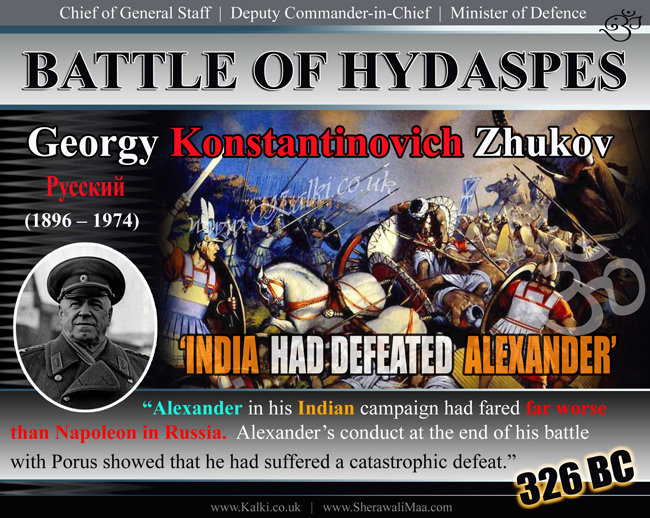 |
★ ♥ ★ A Multicultural Community that unites people from all over the world ★ ♥ ★ |
 |
 |
Russian General: India defeats Alexander the Great |
 |

28-01-2017
|
 |
RHTDM
KALKI is offline
|
|
Join Date: Mar 2003
Location: I own a tent, it has a hole in it.
Posts: 47,397
Country: 
|
My Mood:

|
Russian General: India defeats Alexander the Great
BATTLE OF HYDASPES (Present Day: Jhelum/Pakistan): RUSSIAN DEPUTY COMMANDER-IN-CHIEF, MINSTER OF DEFENCE & CHIEF OF GENERAL STAFF;
GEORGY KONSTANTINOVICH ZHUKOV (1896 – 1974) Marshal of the Soviet Union, the most important Soviet military
commander during World War II. Napoleon failed to conquer Russia in 1812. ZHUKOV SAID:
During the Battle of Hydaspes 326BC (Present day: 'Hydaspes' = Jhelam, Pakistan)
“Alexander in his Indian campaign had fared far worse than
Napoleon in Russia.
Alexander’s conduct at the end of his battle with Porus
showed that he had suffered
a catastrophic defeat.”
|| Porus/Paurava kingdom was an ancient kingdom in northwest Indian subcontinent.
Its first capital was Hastinapur - as mentioned in the epic Mahabharat. ||
Alexander’s campaign against the Persian Empire consisted of a series of raids in which he plundered wealthy cities like Issus, Susa and Persepolis, the last of which he reduced to ashes. They were not unlike Mahmud of Ghazni’s raids into India 1300 years later. Darius III, the unworthy bearer of a great name, proved both incompetent and unpopular. He was captured and killed by one of his own subordinate rulers, Bessus of Bactria. In his Persian campaigns Alexander was greatly helped by his general Parmenion (c. 400 — 330 BC) who had loyally served his father also. Alexander repaid hiDarius IIIs loyalty by having the seventy year-old general executed on false charges of disloyalty. (This shows that Alexander was not the kind of man to reward a defeated adversary like Porus.)
By 330 BC, Alexander found himself in Central Asia and Bactria (Afghanistan), trying to consolidate his hold over what were once parts of the Persian Empire. He was now near the border of India. He, like his contemporaries had heard a great deal about the country and its legendary wealth. Whether it was his love of plunder or imperial ambition that attracted him, he descended into the plains of Punjab in the winter of 327 BC.
||
Source: Plutarch - “This last combat with Porus took off the edge of the Macedonians’ courage and stayed
their further progress in India…. Alexander not only offered to Porus to govern his own kingdom as satrap under himself
but gave him also the additional territory of various independent tribes whom he had subdued.” || www.SherawaliMaa.com




|
 |
|
 |
 18-05-2019
18-05-2019
|
#2
|
|
Nutty Poster!
jay999 is offline
Join Date: Mar 2006
Posts: 1,455
My Mood:

Status:
Teacher: Why are you talking during my lesson?
Student: Why are you teaching during my
conversation?
|
Western history is full of shit
https://en.wikipedia.org/wiki/Indian...nder_the_Great
Quote:
|
Alexander's continued eastward march was leading his army into a confrontation with the Nanda Empire, based in Magadha. According to Greek sources, the Nanda army was five times the size of the Macedonian army;[4] Alexander's troops—increasingly exhausted, homesick, and anxious by the prospects of having to further face large Indian armies throughout the Indo-Gangetic Plain—mutinied at the Hyphasis River, refusing to advance his push to the east. After a meeting with his army general Coenus, during which he was informed of his soldiers' laments, Alexander relented under the conviction that it was better to return. He subsequently turned southward, advancing through southern Punjab as well as Sindh, where he conquered more tribes along the lower areas of the Indus River, before finally turning westward to reach Macedon
|
|
|
|

|
 |
|
 |
 18-05-2019
18-05-2019
|
#3
|
|
Zombie Poster
Asiansoul is offline
Join Date: Jan 2007
Posts: 1,590
My Mood:

Country 
Star Sign:  |
They downplay Indian hisory all the time.
Inflated ego
worth a read:
https://www.rbth.com/blogs/2013/06/0...g_of_war_25749
Quote:
Zhukov’s take
“Following Alexander’s failure to gain a position in India and the defeat of his successor Seleucus Nikator, relationships between the Indians and the Greeks and the Romans later, was mainly through trade and diplomacy. Also the Greeks and other ancient peoples did not see themselves as in any way superior, only different.”
This statement by Russia’s Marshal Gregory Zhukov on the Macedonian invasion of India in 326 BCE is significant because unlike the prejudiced colonial and Western historians, the Greeks and later Romans viewed Indians differently. For instance, Arrian writes in Alexander Anabasis that the Indians were the noblest among all Asians.
In fact, Arrian and other Greeks say the Indians were relentless in their attacks on the invaders. They say if the people of Punjab and Sindh were fierce, then in the eastern part of India “the men were superior in stature and courage”.
All this is glossed over by Western historians, in whose view the one victory over king Porus amounted to the “conquest of India”. But the Greeks made no such claim.
|

|
|
|

|
 Posting Rules
Posting Rules
|
You may not post new threads
You may not post replies
You may not post attachments
You may not edit your posts
HTML code is Off
|
|
|
All times are GMT +1. The time now is 22:10.
|